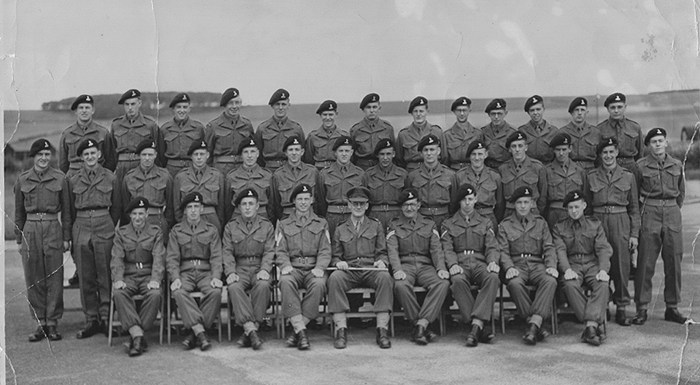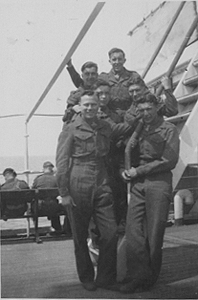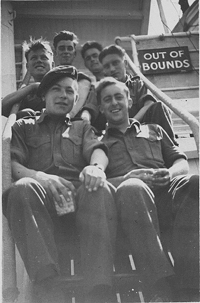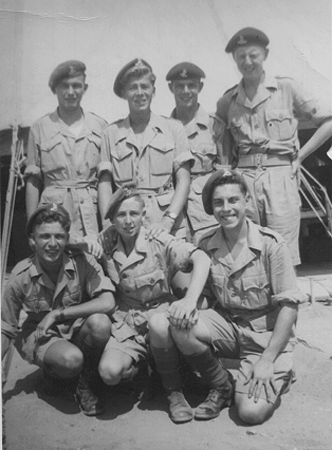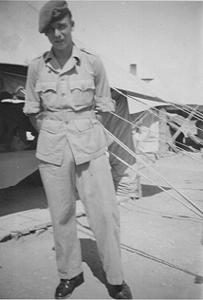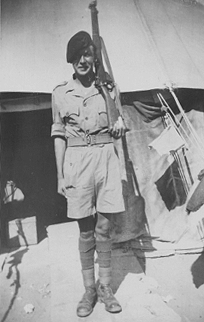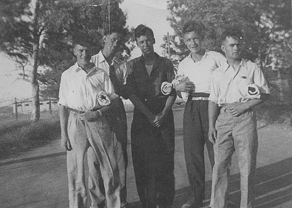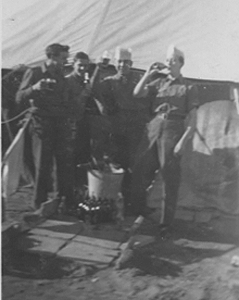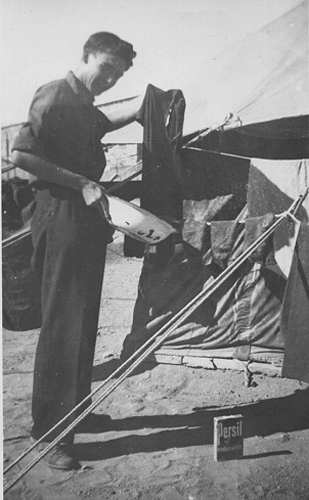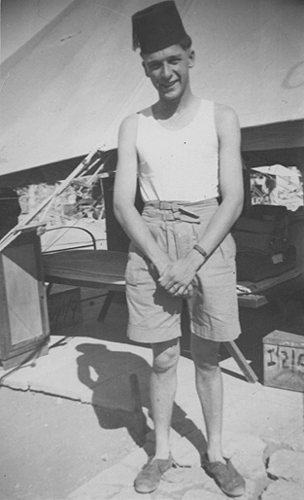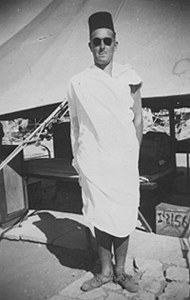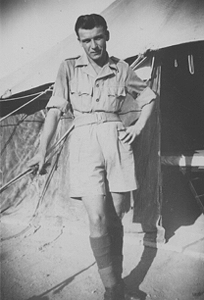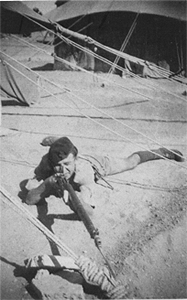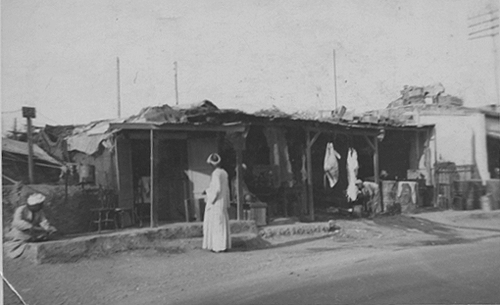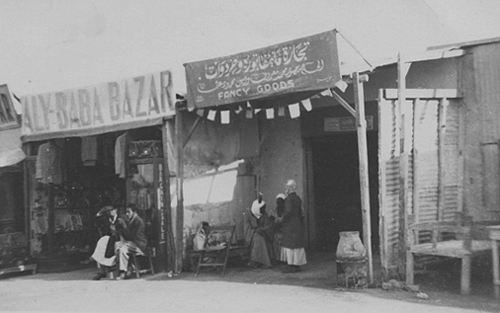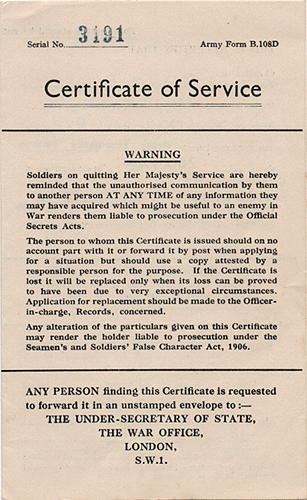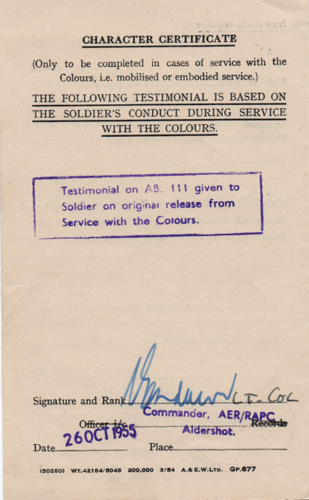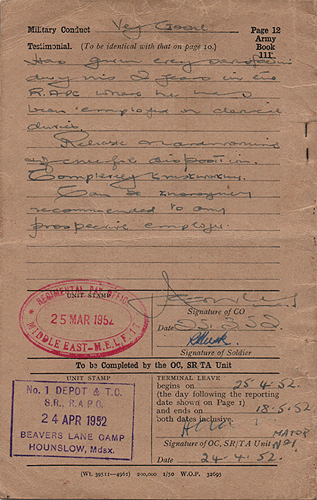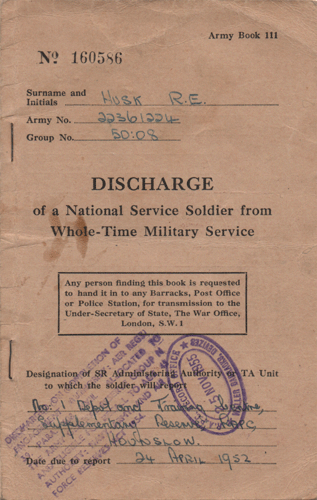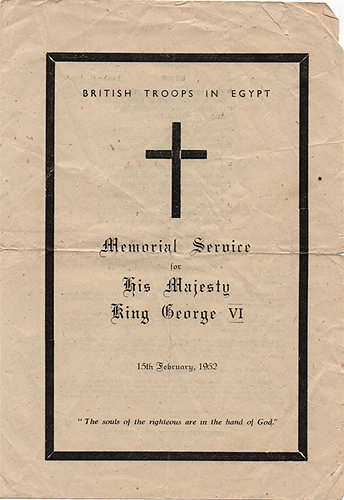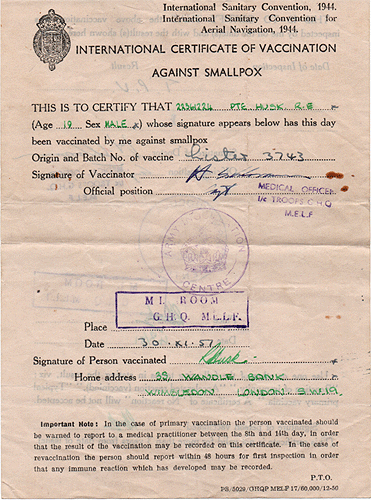R.A.P.C RPO, MAIDA CAMP, FAYID - 1951-52
As Remembered By 22361224 Ronald E. Husk
|
|
|
Aboard the Empire Test .... |
.... On our way to Egypt
|
Some of the RPO Staff
|
Me, looking very smart |
Ready for Guard Duty
|
Returning from the Lido in Fayid with friends |
|
Dhobi Day |
|
Too much sun? |
Yes, definitely too much sun! |
Outside our tent
|
Guarding our tent |
|
Fayid Shopping Centre |
Fayid Shopping Centre |
|
|
|
|
| 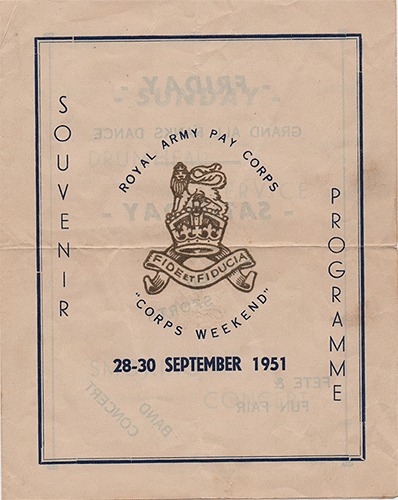 |
| 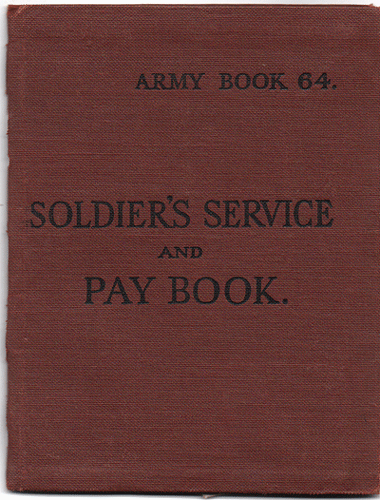 |
OUR ARRIVAL AT MAIDA CAMP
The deck above us echoed with the sound of tramping boots. We had, throughout our journey worn only ‘shoes PT’ to avoid unnecessary damage to the aging wooden deck, and also to keep noise to a minimum. The ‘Test’ was alongside a pontoon, winches and cranes swinging from the hatches, laden with stores and supplies. We breakfasted, kitted up in full FSMO, and thence up on deck in preparation and wait our turn to disembark. I remember the white uniformed policemen (the first I had ever seen armed), a bit shabby of dress, a 30 inch baton secured to their belts, and menacing, rather antique rifles slung over their shoulders. The policemen were there to prevent the hordes of natives from swarming up the ships sides in order to sell us an immense quantity of wares, and supposedly their daughters or sisters – when, and how we could take advantage of the latter offer beggars belief. We had been forewarned of the skills of these con artists and were already on a high state of alert so as not to become victims of them; but nothing could have prepared us for their persistent efforts to part us from the little money that lined our pockets. A myriad of small boats surrounded the ship, from some of them divers plunged to the bottom of the harbour to retrieve the piastres (ackers as we would soon learn to call them), others who had either bribed the policemen or were in some way related to them, scaled the sides of our ship to sit astride the rails and haul up small baskets containing the wares they hoped to sell us. 90% of it rubbish, for want of a better word. I remember little else about going ashore, there was certainly no welcoming band on the quayside as in the glorious day of yore, just a bunch of overladen eighteen or nineteen year olds in rather disheveled khaki drill, the shorts of which descended to, and in some cases below, the knees – this was a short time affair, given that half a dozen wash sessions with the camp dhobi and they would scarcely conceal ones wedding tackle!
We marched along the dock to board a waiting train. There was no door as such, more of an entrance as on a bus platform, but higher off the ground with a step up to it. While most of our group grabbed the metal seats for our journey south to Fayid, I was ordered by S/Sgt Fry to take up a position on the platform, above the running board, remove my belt and use it as a deterrent to dissuade anybody with ambitions to climb aboard. I should mention at this point that the train travelled at about five miles per hour for most of the journey, not a speed that would deter someone wishing to hitch a ride. Needless to say I was somewhat apprehensive at the thought of whacking some poor peasants knuckles with my belt. I took up my position with some trepidation, and I didn’t have to wait too long to expound my worst fears. We were barely moving when this little lad appeared, a huge grin on his face, he looked about eight or ten, but was probably older. He grabbed the rail and attempted to leap on board. I wave my belt in his direction and told him to get off but he knew he had the better of me, his grin widened as he easily kept pace with the train. My pleas to him fell on deaf ears and had no effect on the hold he had on the handrail. I upped my tone of voice and threatened him with my belt. It was either this or the timely re-appearance of S/Sgt Fry with his three stripes and crown that made him relax his grip and abandon his efforts to board the train.
The train trundled on alongside the Sweetwater Canal, offering us our first real insight as to how the natives of this fly blown land lived. Every sort of ablution activity took place in its waters. It was also the prime source of their drinking water too, which they shared with camels, donkeys, oxen and dogs. Little did we realise at that time that we too would be drinking from the same ‘well’, but thankfully for us it would be much purified by the skills of the Royal Engineers before it reached our mouths. Great ships seemed to fill the Canal itself, from the distance of our train they appeared to all but scrape the sides as they piloted either towards Suez or the Red Sea. We came to a halt at Ismailia, where those from other corps or regiments, who were to serve there or nearby, detrained. I had thankfully been relieved of my platform duty and was able to enjoy the amusement provided for us by the local traders that thronged the station platform. We had arrived in a land of retailers, all capable of creating a huge amount of overtime for trading standards officers had they been invented at that time, all would soon be known to us as “Klefty Wallahs”. I remember one of our number being conned out of the money that he handed over for a wristwatch, the negotiations took just long enough to complete as the train began to move, the purchaser holding on to the strap of the watch partly concealed in the vendors hand. The exchange of cash was made as we slowly gathered speed, the seller jogging alongside to keep pace, at a precisely judged moment the trader peeled off to disappear amongst the throng, the buyer a proud possessor of a strap minus the watch. Here endeth the first lesson!
I really do not remember much about our transfer from the train to our final destination, there were more sights to see and amaze us on our journey onwards to Fayid. I recall a native washing in the Sweetwater Canal, one hand waving to our womenfolk at the front of the train (married families, WRAC, QUARANC etc), the other gripping and enthusiastically waving his wedding tackle with a huge grin on his face.
Upon our arrival at Fayid we formed up outside the Orderly Office at Maida Camp, passing squaddies greeted us with the cry of “Get you knees brown”, which would continue mercilessly until this change came about, as it did to all of us eventually, even those of fair skin like George Price, who really did suffer from the change of climate. As we acquired the necessary depth of tan, the constant verbal would gradually decrease, and as new arrivals presented themselves at later dates, they would be the subject of the pre-mentioned request, by which time we would be fully integrated and joined in profusely at the sight of milk white legs extending from a baggy pair of khaki shorts. Such ribaldry was never directed at the WRACs that worked with us in the offices, I can only remember them wearing thick khaki stockings
Maida Camp was situated at the far end of the road that led from the Canal itself, the Great Bitter Lake at this point, through the native village, over the Sweetwater Canal. On the left the RMP camp, that also housed the police dogs that howled and barked incessantly, and of course the RMPs themselves. A roundabout stood at the junction between the village and the Treaty Road, the main throughfare which ran from Port Said to Port Suez in the South. Maida Camp stood at the apex of the round, beyond which stood Mount Shubra that dominated the otherwise flat landscape. Mount Shubra was more affectionally know to us all as the ‘Big Flea’ and all that lived in its shadow were seemingly drawn to its summit at least once during their stay in Fayid, after all there was little else by way of adventure for us.
The camps entrance was the usual military style gate – a weighted red and white pole, secured at one end with a long chain to facilitate raising and lowering, the usual sentry box, and opposite that the Guard Room with its verandah, behind which stood two or three cells, and then the Armoury. Twenty or so yards into the camp stood the Orderly Offices, plus the Adjutant and CO’s offices. On the right hand side of the camp road stood the Officer’s quarters and mess, away from all the riff-raff that were housed in tents on the left side of the road. The first of the tent lines housed HQ Company, mostly GDs MT drivers etc., then Command Pay Office Staff, Officer’s Accounts and finally RPO staff. At the far end both the Cookhouse and the NAAFI were to be found. The RPO offices stretched beyond this to the Sergeant’s Mess and tents lines. Then came No. 3 Guardroom near the perimeter, thence open desert.
The latrines deserve
a special mention as they would undoubtedly win first prize in the least attractive
part of the camp. Only one, situated within the office area afforded the privacy
and luxury of a door – sadly this was only used in cases of dire emergency
which could be all too frequent when stricken by Gyppy Tummy. Its design was
a very, very deep hole, a bench seat over with a hinged flap acting as a cover
that then lifted released the most obnoxious combination of methane plus many
more not too pleasant aromas, which guaranteed a hasty evacuation and departure.
An experiment was carried out once to calculate the depth, the seat lifted,
and a quarter brick was thrown in but nobody could stay within long enough
to hear it hit the bottom! The other latrines were situated for obvious reasons
quite close to the perimeters, as far a possible from tent lines. These provided
the absolute minimal of standards or comfort, primitive does not describe
them, just a step up from a hole in the ground, or perhaps the Sweet Water
Canal so favoured by the native population. A urinal of sorts was formed by
the curving of sheets of corrugated steel, heavily, and frequently coated
with a thick oil based disinfectant. Behind this were five cubicles, no doors,
simply a seat plus hinged lid which when lifted revealed a large container
the size of a dustbin, again suitably coated with disinfectant. Access was
proved at the rear to facilitate the emptying of these bins daily into a three
tonner which made its rounds of the camp with its stinking load, the likes
of which it would be impossible
to communicate to those who have been denied the experience. At the time of
our arrival this unenviable task was carried out by native labour, who appeared
to have no problems at all with their chosen occupation, but, at a later date,
when hostilities began and all native labour withdrew under threat of reprisals
from activists, a hearty bunch of GDs took on the task with great gusto. With
much crashing of bins on the metal sides of the truck to empty the contents,
these guys went about their business with cries of “Any more for any
more”. it was rumoured that they received a special rate of pay and
unique laundering facilities. Heroes every one of them, and still they await
their medals!!
We were allocated temporary accommodation, I was assigned to a tent in the CPO lines, the only occupant that I remember was a regular corporal, George Headley, married with two children, he hailed from Battersea and I suppose its close proximity to Wimbledon, my home town enabled us to get on really well almost immediately and we would remain good friends for the whole of my stay at the camp. It must have been Friday that we arrived as we were given nothing to do until reporting to our posts on Monday. I was to find that I would serve my King in the Post Room at RPO Middle East, Fayid and subsequently tented in the RPO lines. During the course of the weekend, I was able to benefit from George’s valuable experience and learn many of the wrinkles and dodges that one needs to assimilate pretty quickly as a newcomer if one is to survive comfortably and keep a clean sheet. Scoff comes high on any soldiers list of priorities and so the cookhouse and the NAAFI are the first to familiarize oneself with, given the climate, drinking water and shower blocks close second. I had about 48 hours to discover everything and George introduced me to Fayid village and the lido.
By Sunday evening I was in the grips (perhaps ‘Gripes’) of my first brush with the dreaded ‘Gyppy Tummy’. I can remember crawling on all fours through the sand to get to the latrines near the perimeter, unable to walk, vomiting violently as I went, by reveille I was shattered and reported sick for the only time during my service. I was taken to the MI Centre and told by the MO “It happens to everyone sooner or later”, I was given a couple of pills and told to get off to work. I felt that I should have been given at least two weeks in bed at BMH – perhaps this was a lucky escape as I later discovered it was staffed by rear gunners not the divine QUARANC nurses in their red lined cloaks.
I reported to work late due to my visit to the MI Centre which was not a good way to start a new job and even less ideal for a first meeting with Sgt Major (WO2) ‘Dusty’ Miller who was responsible for the overall running of the Post Room amongst other sections of the offices. He was also CSM to the incumbents of the tent lines occupied by A & B Companies RPO. My late arrival was greeted with a very unsympathetic response. A rounded, very red face, upper lip supporting a fine military moustache, thrust itself within six inches of mine and said “You don’t report sick with the sh-ts here!!. Everybody gets it sooner or later,”
